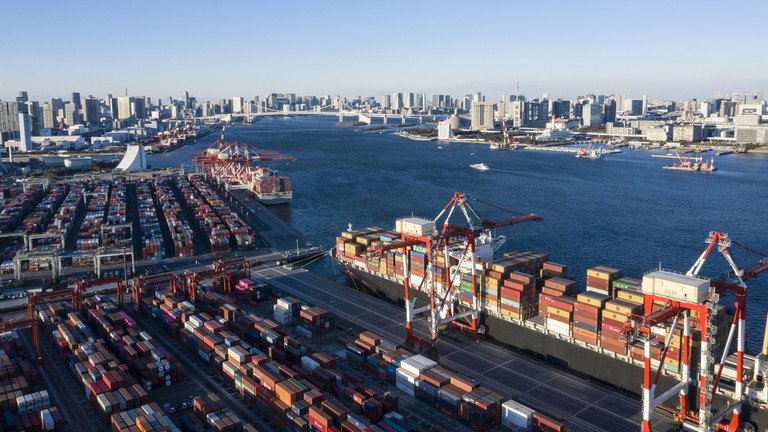The growth comes despite Tokyo’s widening of restrictions in trade with Moscow
The total volume of Japanese exports to Russia rose by 25% in July year-on-year to 50.94 billion yen ($348 million), the Ministry of Finance in Tokyo has revealed.
Data shows Tokyo ramped up supplies of medical products by 1,123% compared to July 2022. Exports of rubber and paper products were also up by 248% and 45% respectively, although deliveries of plastics and steel fell by 35% and 94%.
At the same time, the East Asian nation’s imports of Russian grain skyrocketed by 5,679% in July in annual terms. Imports of fish and fish products for the same period decreased by 35.3%, while purchases of vegetables dropped by 30%.
Japan’s overall imports from Russia declined by nearly 70% due to a decrease in Russian liquefied natural gas (LNG) and coal shipments, which contribute to about 60% of Russia’s overall exports to Tokyo.
Statistics showed imports of Russian LNG by Japan decreased by 53.6% in July. Coal imports sank by 72.9%, while deliveries of non-ferrous metals were down 69.5%.
The decline comes in the wake of Tokyo’s tightening restrictions on trade with Moscow. The Japanese government recently expanded its package of sanctions against Russia, with 758 new items added to the list of goods prohibited for supply.
Japan joined a US-led sanctions campaign against Russia last year in response to the conflict in Ukraine. Previous Tokyo sanctions include asset freezes, export bans, and the revocation of Moscow’s ‘most-favored nation’ trade status. Japan has also blacklisted 80 Russian military-related companies and organizations, including firms that produce heavy machinery.
Moscow recently said it was “considering retaliatory steps,” with the Russian Foreign Ministry noting that it viewed Japan’s penalties “very negatively.” The Kremlin earlier blacklisted nearly 400 Japanese lawmakers in response to sanctions and the country’s “unfriendly, anti-Russian position.” It also banned entry to dozens of senior officials, among them Prime Minister Fumio Kishida.
Source: RT



